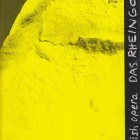Rheingold 1989Scottish Opera
Read more about the opera Rhinegold
The company here embarked upon its second Ring project. Rheingold began very promisingly, and Die Walküre was even better. Sadly the money ran out and the project was cancelled at the half-way stage and never revived. Richard Jones went on to direct a complete Ring at the Royal Opera House a few years later.
Nigel Lowery's designs were a real departure from anything seen before in this work. The first scene, under water, had no trace of the expected stygian gloom. It was brightly lit, with a bright blue triangle hiding the stairs on which the Rhinemaidens stood, with choreographed white-gloved arm movements. They were a strong team and Nicholas Folwell made an immediate impact with his trenchantly-sung Alberich.
The light and airy atmosphere continued with the introduction of the gods, while for the subterranean mines the floor of the set was revealed to be a huge grill lit from below - very effective.
Most of the singers were tackling their parts for the first time, and the leading gods gave wonderful performances. Willard White made a superb Wotan. with a wonderfully rich tone over a wide vocal range, and his stature and body language allowed him to dominate the stage. His rival in this was Felicity Palmer's Fricka. Also tall, and a superbly confident actor, she used the cutting edge of her voice, particularly in the lower range, in a way that made one forget she had begun her career as a lyric soprano adept at Handel and Mozart. A pity that she did not return for Walküre, or continue with the part.
Bonaventura Bottone gave a relaxed and almost cheeky performance as Loge, with a touch almost of punk or hippy in his manner. Anne Williams-King's lyric soprano soared nicely, and Justin Lavender was particularly effective as Froh. Paul Harrhy's Mime and Penelope Walker's Erda were also memorably distinctive, though the latter was handicapped by appearing, head only, in a kind of cardboard cut-out slid on from the wings. There really were no vocal weaknesses.
The whole enterprise was very promisingly conducted by Mauceri who drew some impressive sounds from the orchestra. This cycle had such a promising start that it was sad to see it lose momentum. With these performances in the Spring of 1989 and Die Walküre not following until Autumn 1991, Siegfried would only have appeared after a similar gap, and even if Götterdämmerung had been achieved there was no prospect of any cycles ever being heard.
Scottish Opera's next Ring production was assembled much more uickly and built up a real; head of steam between Rheingold in 2000 and several cycles in 2003.
Scottish Opera's Season - 1988/89
The programme for the 1988-89 season of Scottish Opera opened with Midsummer Marriage. The other new productions were Fledermaus, Rheingold, Don Giovanni, Oedipus Rex, Traviata and Street Scene. The revivals were Magic Flute, Iolanthe, and Bohème, In the autumn the previous season's Richard Jones Così fan tutte, redirected by Tim Hopkins, went out on the medium-scale tour. There was also a small-scale, piano-accompanied tour of Don Carlos, so far Scottish Opera's only attempt at this work.
Performance Cast
- Woglinde a Rhinemaiden
- Wellgunde a Rhinemaiden
- Flosshilde a Rhinemaiden
- Alberich a Nibelung
- Wotan leader of the gods
- Fricka wife of Wotan and goddess of marriage
- Freia sister of Fricka and goddess of love and spring
- Fasolt a giant
- Fafner a giant
- Froh god of joy and youth
- Donner god of thunder
- Loge god of fire and cunning
- Mime a Nibelung, Alberich's brother
- Erda goddess of earth and wisdom
Performance DatesRheingold 1989
Theatre Royal, Glasgow | Glasgow
27 Jan, 19.15 4 Feb, 19.15 10 Feb, 19.15 14 Feb, 19.15 13 Apr, 19.15
His Majesty's Theatre, Aberdeen | Aberdeen
23 Feb, 19.15
Playhouse Theatre, Edinburgh | Edinburgh
2 Mar, 19.15 4 Mar, 19.15
Apollo Theatre | Oxford
9 Mar, 19.15 11 Mar, 19.15
Theatre Royal, Newcastle | Newcastle-upon-Tyne
8 Apr, 19.15

